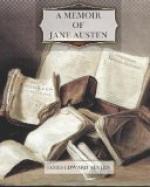Her eldest brother James, my own father, had, when a very young man, at St. John’s College, Oxford, been the originator and chief supporter of a periodical paper called ‘The Loiterer,’ written somewhat on the plan of the ‘Spectator’ and its successors, but nearly confined to subjects connected with the University. In after life he used to speak very slightingly of this early work, which he had the better right to do, as, whatever may have been the degree of their merits, the best papers had certainly been written by himself. He was well read in English literature, had a correct taste, and wrote readily and happily, both in prose and verse. He was more than ten years older than Jane, and had, I believe, a large share in directing her reading and forming her taste.
Her second brother, Edward, had been a good deal separated from the rest of the family, as he was early adopted by his cousin, Mr. Knight, of Godmersham Park in Kent and Chawton House in Hampshire; and finally came into possession both of the property and the name. But though a good deal separated in childhood, they were much together in after life, and Jane gave a large share of her affections to him and his children. Mr. Knight was not only a very amiable man, kind and indulgent to all connected with him, but possessed also a spirit of fun and liveliness, which made him especially delightful to all young people.
Her third brother, Henry, had great conversational powers, and inherited from his father an eager and sanguine disposition. He was a very entertaining companion, but had perhaps less steadiness of purpose, certainly less success in life, than his brothers. He became a clergyman when middle-aged; and an allusion to his sermons will be found in one of Jane’s letters. At one time he resided in London, and was useful in transacting his sister’s business with her publishers.
Her two youngest brothers, Francis and Charles, were sailors during that glorious period of the British navy which comprises the close of the last and the beginning of the present century, when it was impossible for an officer to be almost always afloat, as these brothers were, without seeing service which, in these days, would be considered distinguished. Accordingly, they were continually engaged in actions of more or less importance, and sometimes gained promotion by their success. Both rose to the rank of Admiral, and carried out their flags to distant stations.
Francis lived to attain the very summit of his profession, having died, in his ninety-third year, G.C.B. and Senior Admiral of the Fleet, in 1865. He possessed great firmness of character, with a strong sense of duty, whether due from himself to others, or from others to himself. He was consequently a strict disciplinarian; but, as he was a very religious man, it was remarked of him (for in those days, at least, it was remarkable) that he maintained this discipline without ever uttering an oath or permitting one in his presence. On one occasion, when ashore in a seaside town, he was spoken of as ’the officer who kneeled at church;’ a custom which now happily would not be thought peculiar.




